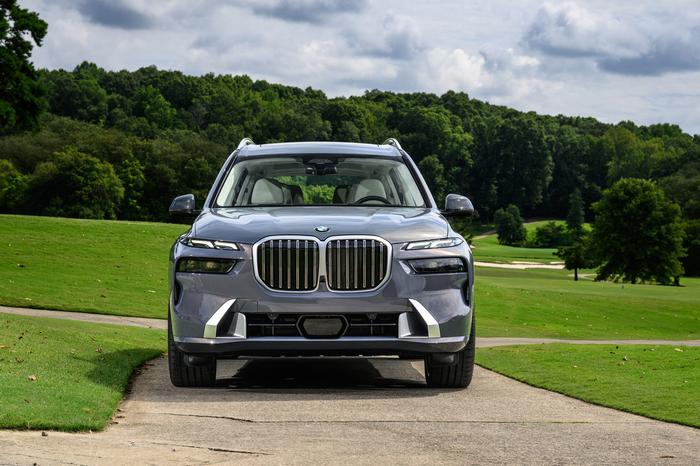2023 BMW X7 SUV Review

We've driven the updated BMW X7 SUV.
A significant update for BMW’s biggest SUV keeps the X7 up to date – mostly.
Review
Pros: masses of space, very luxurious, latest technology, great chassis
Cons: no plug-in option, too big for Irish roads
To ensure that its largest SUV wouldn’t look outdated by the arrival of a high-tech new BMW 7 Series, the German company has given the X7 a comprehensive mid-life overhaul, redesigning the nose, upgrading the interior with its latest technology and adding mild-hybrid power to the three engines. Will any of this make it more suitable for Irish roads than before?
BMW X7 Design
To align the updated X7 with the new 7 Series, BMW restyled the front end to look like it. That means a new split-level light arrangement with super-thin LED daytime running lamps and a large radiator grille. A final flourish is integrating the aerodynamic air vents on either side of the front bumper with the shape of the lights. Not everyone will approve of the dramatic design, but we’d argue that the split-level look works better on the X7 than it does on the lower-slung 7 Series saloon.
Elsewhere, the X7 has been more subtly tweaked, in design terms, with reprofiled rear lights and new paint colour options. Meanwhile, buyers can for the first time specify 23-inch alloy wheels from the factory.
The Excellence and M Sport trim levels look notably different, while the range-topping M60i model gets its own aggressive makeover, dominated by lots of black highlights.
BMW X7 Interior
Inside, the X7 retains its spacious seven-seat layout, with the option to order a car with two full-size seats in the second row instead of the default three-seat bench. There’s a lot of room for passengers in all seats and it feels like a luxury car. New, along with a few detail trim changes, is the addition of BMW’s curved display dashboard, an innovative ambient lighting system and restyled centre console. While the result is a more modern looking cabin, in keeping with BMW’s most contemporary cars, the dual-screen system also brings with it BMW’s “Operating System 8.0”, which features a wealth of communication and driver assistance functionality. It takes a little getting used to, but it’s a formidable system and BMW allows drivers to interface with it in many ways – voice, gesture, touchscreen, buttons on the steering wheel and – our favourite – the good old-fashioned rotary “iDrive” controller between the front seats.
BMW X7 Performance & Drive
There are three core powertrain models to choose from, all featuring xDrive all-wheel drive and a new eight-speed automatic gearbox as standard. The latter now features a compact electric motor within the casing as part of the 48-volt mild-hybrid system that can add small amounts of power to the engine’s and recuperate energy to a battery while slowing down.
Topping the line-up is the X7 M60i, powered by a twin-turbocharged 4.4-litre V8 petrol engine. It puts out a huge 530hp and 750Nm of torque for a scarcely-believable 0-100km/h time of just 4.7 seconds. This model comes with all the available chassis upgrades as standard – including rear-wheel steering – to help it live up to the M badge. Thankfully, its air suspension (this is standard across the range) helps even this sporty model ride as you’d hope a luxury car would.
The X7 xDrive40i, meanwhile, features a revised 3.0-litre straight-six petrol engine. Its maximum outputs are 380hp and 520Nm, meaning 0-100km/h in a still-impressive 5.8 seconds. The six-cylinder engine sounds every bit as good as the M60i’s V8, too, while using significantly less fuel.
And on the subject of fuel economy, it should be of no surprise that most X7s sold in Ireland to date have been powered by diesel. The xDrive40d arrives with 340hp and 700Nm of torque and still manages the 0-100km/h time in 5.9 seconds. Its six-cylinder engine isn’t as quiet as the petrol alternatives, but it’s the best for towing – and certainly the best for long-distance efficiency.
It's on such long journeys that the X7 excels, thanks to exceptional noise suppression and comfort.
BMW X7 Pricing
The entry-level Excellence trim costs from €150,906 when paired with the xDrive40d diesel engine or €151,812 with the xDrive40i petrol option. The M Sport equivalents are €156,456 and €157,362, respectively. That V8-engined M60i sits apart as a standalone model costing from €192,545.
Carzone Verdict: 4/5
Many will assume that the X7 feels like a slightly larger BMW X5, but the truth is that it feels far more luxurious and spacious than that. It does everything competently and even undercuts the equivalent Range Rover, for example. Nonetheless, it isn’t a car optimised for Irish roads and the Irish market. Sure, its technology is bang up to date, but the lack of any plug-in option in the range is a glaring omission. It will remain a rare car here in that case, but on the flipside, that will only add to its exclusivity.



